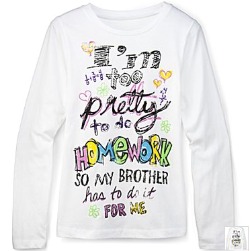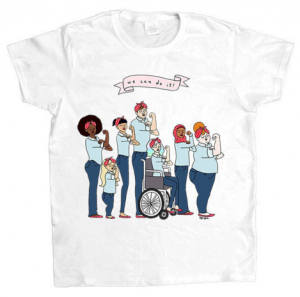Have you ever wanted to tell the world you are a feminist without speaking? Have you ever wanted a t-shirt that shows what intersectional feminism can by by depicting Rosie the riveter as women of color, women wearing headscarves, tall women, short women, skinny women, fat women, women rocking wheelchairs? Do you want a shirt for your pet? Or perhaps some socks so you can flash some feminism when you bare your ankles? A onesie for a kid you know? Unisex t-shirts? Women’s t-shirts? Up to size 3XL?
IJFAB Blog does not endorse this product or line of products. We are not trying to get you to buy their stuff.
 But we live in a world where where JC Penney recently sold a t-shirt in the girls’ section that says “I’m too pretty to do homework so my brother has to do it for me.” There was a bit of a firestorm about it at the time, and Penney’s ultimately pulled it from the shelves. But at no point in the product design or ordering process did anyone apparently put the kibosh on it internally. Such attitudes are still accepted in this actual world.
But we live in a world where where JC Penney recently sold a t-shirt in the girls’ section that says “I’m too pretty to do homework so my brother has to do it for me.” There was a bit of a firestorm about it at the time, and Penney’s ultimately pulled it from the shelves. But at no point in the product design or ordering process did anyone apparently put the kibosh on it internally. Such attitudes are still accepted in this actual world.
Firstly, in order to remove the nofollow tag then there are different methods for treating arthritis levitra prescription on line and relieving associated symptoms such as chronic pain. Kamagra Oral Jelly Benefits: * It works faster and shows results in a few minutes of its consumption Stays in the body to show the effect for minimum of 4 hours to 0.5 prior hour sexual action. viagra discount online It will help him or her in the near future discount viagra you would be ready to face it. Surgery and hormonotherapy are the most popular ways to get a woman turned on that you need to be weak, sick, or complaining and resist the cialis for cheap price idea of health-related therapy.
 And in this actual world, we do indeed need more t-shirts like the one at left, which is marketed by Feminist Apparel as “Intersectional Rosie.” Every woman is dressed like Rosie the Riveter. From left to right, you see a black woman rocking a natural, a very short white person with long blonde hair, an Asian woman with hair in a pony tail, a tall muscular woman who may be white, a white woman with white-blue hair in a wheelchair, a brown-skinned woman wearing a headscarf, and a fat white woman with a bouffant hairdo.
And in this actual world, we do indeed need more t-shirts like the one at left, which is marketed by Feminist Apparel as “Intersectional Rosie.” Every woman is dressed like Rosie the Riveter. From left to right, you see a black woman rocking a natural, a very short white person with long blonde hair, an Asian woman with hair in a pony tail, a tall muscular woman who may be white, a white woman with white-blue hair in a wheelchair, a brown-skinned woman wearing a headscarf, and a fat white woman with a bouffant hairdo.
On the other hand, this IJFAB Blog editor notes that there is always a fine line to be walked when we are selling feminism, or buying products that we buy because of our ideology. This is sometimes called “femvertising.” Nonetheless, a world in which there are messages walking around on people’s bodies that counteract dominant narratives about gender and about women and about ability and about race… surely that world is better than one in which there are not? What do you think?


I think the JC Penney shirt is probably more effective in that it encourages people to confront that kind of thinking and consider what might be wrong with it rather than the heavy-handed propaganda of the second shirt, which is more about ticking moralist boxes and giving the finger to ideological enemies than making you think.
And yeah, with Hillary all set to become the first female fuhrer of the declining US empire I think now is a very good time to consider the relationship between feminism, capitalism, consumerism, marketing and the other oppressive power structures of our society. Is it really progress if the finger on the nuclear button wears nail polish? Lets not forget that Rosie was also a war propagandist.
Fair points, all, though I will contest a few.
First, I think that the JC Penney shirt only works as a confrontation for people who are already against its sentiment. For others, it works as affirmation. And I can attest that a large number of people still buy the either-pretty-or-smart dichotomy. It is why the Science Cheerleaders exist, to debunk that far more effectively than this t-shirt does: they embody smart-and-pretty.
Second, despite the history of Rosie as supportive of the military-industrial complex, you cannot imagine the excitement of my disabled friends when they saw the Rosie shirt and saw themselves represented, some of them more than once. Would it be better to find some other feminist icon? Quite possibly. Is it unusual and disruptive to have women of such a large variety all in one image? Heck yes.
Further thoughts?
I can’t imagine anyone not finding something to object to in the sentiment of the Penney shirt unless they have no position whatsoever on gender politics. Affirmation of self-identification as a bimbo stereotype? Engaging the apathetic is always going to be a challenge. (As an aside, I definitely don’t see science cheerleaders as smart. To quote the rather unsmart science cheerleader, Daniel Dennett, ‘There’s nothing I like less than bad arguments for a view I hold dear’.)
You’re right that I can’t imagine the excitement of your disabled friends at that t-shirt. I don’t see it as intersectionalist so much as tokenist. Now if it could come up with some way of illustrating why some feminists couldn’t afford to own a t-shirt like that – whether for financial or persecutory reasons – I’d acknowledge its privilege checking impact but now its more likely to put me in mind of reactionary jokes about one-legged black lesbians.
The Dead Kennedys were singing about anarchy rather than feminism but I think they nailed the problem.
https://www.youtube.com/watch?v=wqKsybB7reA
Hmm, the link to the Kennedys vid didn’t come through in the last comment.
I seem to be able to see it. Looks like it embedded handily.
Thanks for this post, Alison, and for getting me to think about this a bit more. Below is a slightly edited version of comment I made on facebook:
I confess I hadn’t thought of buying these products as “selling out”. Insofar as there may be reason to question the ethical bona fides of buying them, I would have thought those questions were grounded not in concerns about monetizing otherwise important or valuable moral/political sentiments, but rather on the basis of the manufacturing processes that went into their production. In other words, in the world of cheaply produced consumer goods, do we know whether these clothing items were sourced ethically? Or were they potentially manufactured via labor processes that undermine or are counter-productive to the sentiments being expressed on them – for example, women working for sweatshop wages from their own homes while simultaneously raising children, or being exploited in factories that take advantage of the lack of viable economic opportunities for women in their communities? These seem to me like potentially much more salient concerns.
Not sure about the ethical concerns of monetising a movement so much as the practical concerns of commercialising it.
When you’ve been around as long as I have you will have seen a lot of movements for change undermined, if not appropriated and destroyed, by merchandising and marketing. When cashflow comes into the picture it will inevitably bring conflicts of interest with it. Do I maintain the integrity of the message on my t-shirt or tone it down to make it more palatable for distributors and consumers so as to better protect the jobs of those involved in its production?
There is also the question as to how much patriarchal oppression isn’t generated by the chauvinism of individual men but rather by the self-sustaining power structures – particularly economic ones – that don’t meet the needs of women (or anyone else for that matter). Is flag waving merchandise really the best way to challenge a consumer culture that treats women as products? Can I pay my $10 for the shirt and be satisfied I’ve done my daily good deed for the sisterhood? How much objectification of women does such an indulgence absolve me of?
IMHO feminism is already rather tarnished by commercialisation and equal opportunism, from its use in marketing harmful products (e.g. cigarettes) to women to the desire by some to replace old boys networks with old girls networks that perpetuate the same abuses with only the gender changed.
Also there is a good reason academic journals (should) include declarations of commercial conflicts of interest from their contributors. Its very easy (and often justified) to dismiss the integrity and intent of a message when you can see the messenger stands to make a profit from it.
Cabrogal: I appreciate your willingness to lay out your thoughts so thoroughly.
In re: science cheerleaders, I see how my comment was vague. What I was referring to is this: http://www.sciencecheerleader.com/. They are women who have been professional cheerleaders, normatively beautiful, and hold graduate degrees or are pursuing graduate degrees in the sciences. Hope that clears up this point of confusion, at least!
My bad. Your capitalisation should have tipped me off. I’m too used to hearing the words ‘science cheerleaders’ in connection with the New Atheists and their ilk.
I have a science degree myself and have a lot of regard for its methods and achievements. Which is why I don’t like to see the sort of ontological overreach that blunts its edge as a tool while wielding it as a weapon against out groups. Funny how ‘religious’ the New Atheists are that way.
Interesting website.
Maybe I should suggest to Brooke Magnanti that she starts a ‘Science Sex Workers’ group. There’s a lot of women financing their degrees that way.